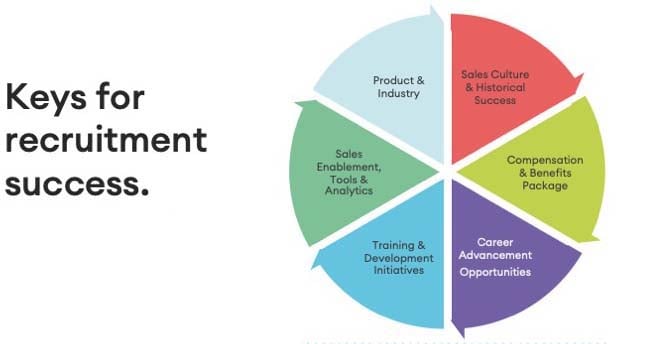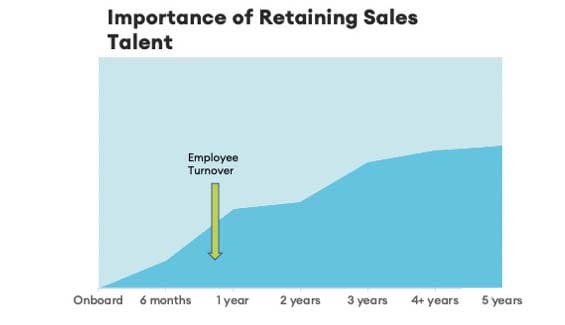Many people hear the word recruitment and think: create a job description and throw that up as the advert, and we’ll be inundated with candidates.
But it’s so much more than that.
In our recent seminar on attracting sales talent to your business, sales-i's Dom Starr, Vice President of North America, and Jeff Palmer, Director of the heavy-duty auto division, discussed the reasons people come into the sales industry and what companies can do to keep them successfully delivering sales for your business beyond the first year.
- Create a great training program.
- Offer quality company incentives.
- Recruit from industries where people have already learned to speak to customers.
- Allow your reps to keep practicing what they learn.
With more than 1,100 customers in distribution sales, sales-i is in a great position to spot insights happening across the sales market. Our knowledge helps to put us at the cutting edge of where technology can deliver results and understand how a sales rep can keep developing their skills and become a great salesperson.
Sales is a great career choice for people from all walks of life. So, let’s look at some of the factors attracting the best people into the industry and what your company can do to bring them on board.
What are sales reps looking for?
A lot of young sales reps these days are looking for job satisfaction no matter which sector they work in. For example:
- Building.
- Janitorial/sanitation.
- Automotive/ heavy duty, parts supply.
- Industrial.
- Medical supply.
And because there aren’t an infinite number of up-and-coming sales reps, we’re all competing for the same precious resources.

Training your product sales reps.
There are some well-established distribution organizations around. But their workforce is getting older. Some sales reps selling heavy-duty truck parts are now in their 80s. If that sounds like your organization, you're not alone. With that mature workforce comes a wealth of experience that can be shared with the rest of the team during training sessions. Something that is key to unlocking great sales enablement for manufacturing and wholesale distribution.
We partnered with Aftermarket Growth Solutions to work with Daimler AG and Navistar International’s top executives to offer online sales training for parts-specific sales teams.
Charles Napier, Principal at Aftermarket Growth Solutions, believes that auto parts is a chronically underserved market when it comes to training. “Heavy part sales haven’t changed much in 40 years. It's still about 3 things: relationships, just-in-time parts delivery, and continuous support."
In Chicago, where we have our US head office, we focus 100% of our time on sales enablement for manufacturing and wholesale distribution. Smaller companies in those sectors are having trouble keeping up with the market demand for parts. And more people are shopping around for parts based on price and availability.
The trouble is sales reps in the parts industry have not changed their strategy to keep hold of the wallet share during that change. Reps who are part of the new wave and know how to keep in touch with their customers while they're changing are the ones doing well.
Why is hiring and retaining talent a big deal in distribution sales?
The actual business of selling only takes a part of a sales rep’s time. Much of their time is spent on the milk run: going out and meeting customers, making sure they're getting everything they need. The personal touch still means a lot in sales, and a rep who can do that well is worth their weight in sales calls.
When sales-i brought in Blore, a market research firm, to run an analyst day in our Europe office, they discovered that it takes about $500 a day to run a sales rep. This includes their health insurance and (more often than not, post-pandemic) the cost of running a vehicle as well.
It takes about a year to onboard a rookie sales rep, so that return on investment (ROI) won’t always get seen before the end of the first 12 months.
"Many sales reps don't make it to a full year."

Measuring a sales reps’ first year
After their first year, a sales rep should:
- Know who their biggest customers are.
- Know their customer's buying patterns.
- Know how to go on milk-run sales calls where they're just out in the field, seeing their customers.
- Move away from selling easy-to-sell, low-margin products.
- No longer need their manager to set up their sales calls (an additional cost).
- Understand competition and how to position themselves.
The problem is that many sales reps don't make it to a year, especially in 2021. The job market is so vast that people often leave right when they’re at the stage where they can self-manage their time and sales calls.
They start looking at competing opportunities. They're looking at sales organizations that may appear better organized or more in tune with their career ambitions. In some cases, they're looking right at your competitors and seeing if they can make more money there.
When we partnered with Talent Tech recruiting, they polled job hunters. 85% of them said that they were after:
- Company cars.
- Recognition events, or bonuses,
- Training, and development,
- Contests or incentive programs,
- Team building days or just spot days off,
- and gym memberships.
Key tips to recruiting the new wave of sales talent
To get that ROI for your effort and their commitment, it’s important to focus on the word talent. Because you want to keep people past that one-year mark where their innate ability to be a great salesperson has been enhanced with your mentoring and training offering.
Passion
When recruiting into heavy-duty distribution, companies are looking for people with product or industry knowledge. They want people who know the product at some deeper level and can talk about it knowledgeably. Remember that your sales rep will be out talking to people who are passionate about their products. So, your reps must share that passion.
Knowledge
It's important - certainly in the long term - to understand product and industry. You have to know what you're selling and who you're selling to.
Expertise
Product and industry expertise is a long-term indicator of success. It shows someone has committed to building up that knowledge base.
Are transferable sales skills a good short-term indicator of success?
An indicator that someone is going to deliver high volumes of sales is recruiting people who bring transferable skills.
Recruit from customer service workers
Sales are about supporting your clients. A good part of the sales role is account management and service areas like hospitality. So, people who have been working in hotel restaurants, serving customers, and learning to gauge a customer’s needs and respond to them are people you want on your team.
Recruit from the recruiting sector
Sometimes, it can feel as though there are more recruiters out there than jobs. And it often seems to be a steppingstone career where you work in recruiting for a long time. And then you move into another career, perhaps into sales itself.
Recruit from the logistics sector
There’s a lot of pent-up demand for products right now. Cargo ships stacked outside of the Los Angeles harbor, 70 deep. And as any decent salesperson knows, there are a lot of logistic businesses out there. They are teaching young sales recruits how to sell, but it's a grinder business: people get ground out quickly if they aren’t developing and being properly mentored. You don’t want your fresh, dynamic sales reps to leave and use their skills in other sectors.
When interviewing, you’re looking for meaningful conversations with people who know the industry they're working in and can make use of those transferable skills. People who know how to put a customer first and are fearless in the pursuit of customer satisfaction.
These are just some of the factors to keep an eye on when recruiting sales teams. While there's always something new for every generation of employees, mixing the latest knowledge with your own industry experience and natural salesperson, people skills will go a long way to guaranteeing that your new sales reps will help grow your business.



